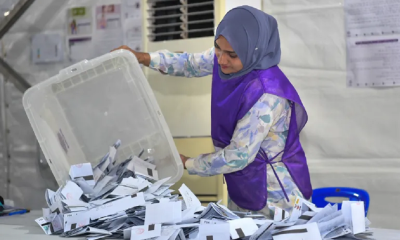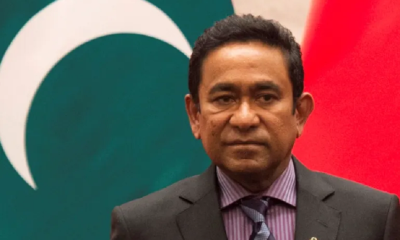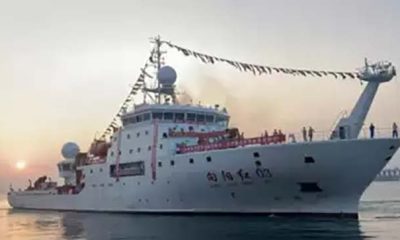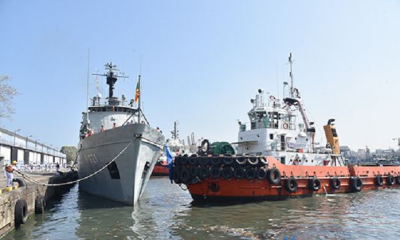News
Maldives to battle rising seas by building fortress islands
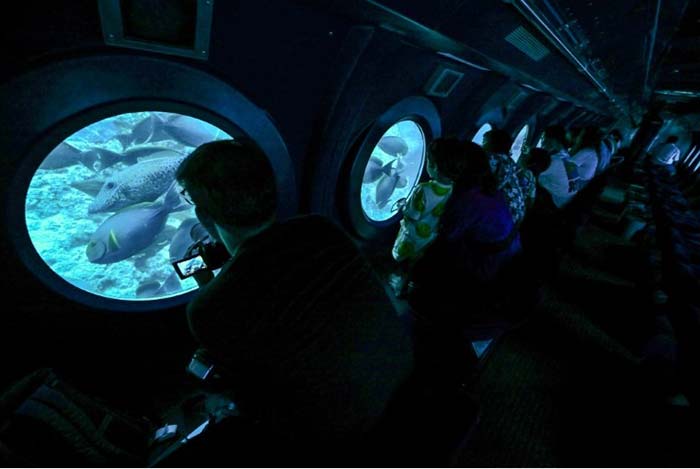
By Amal JAYASINGHE
Malé (Maldives) AFP: Rising sea levels threaten to swamp the Maldives and the Indian Ocean archipelago is already out of drinking water, but the new president says he has scrapped plans to relocate citizens. Instead, President Mohamed Muizzu promises the low-lying nation will beat back the waves through ambitious land reclamation and building islands higher — policies, however, that environmental and rights groups warn could even exacerbate flooding risks.
The upmarket holiday destination is famed for its white sand beaches, turquoise lagoons and vast coral reefs, but the chain of 1,192 tiny islands is on the frontlines of the climate crisis and battling for survival. Former president Mohamed Nasheed began his administration 15 years ago warning citizens they might become the world’s first environmental refugees needing relocation to another country.
He wanted the Maldives to start saving to buy land in neighbouring India,Sri Lanka or even far away in Australia.But Muizzu, 45, while asking for $500 million in foreign funding to protect vulnerable coasts, said his citizens will not be leaving their homeland.
“If we need to increase the area for living or other economic activity, we can do that,” Muizzu told AFP, speaking from the crowded capital Male, which is ringed with concrete sea walls.”We are self-sufficient to look after ourselves”.
The tiny nation of Tuvalu this month inked a deal to give citizens the right to live in Australia when their Pacific homeland is lost beneath the seas.But Muizzu said the Maldives would not follow that route.
“I can categorically say that we definitely don’t need to buy land or even lease land from any country,” Muizzu said.Sea walls will ensure risk areas can be “categorised as a safe island”, he said.But 80 percent of the Maldives is less than a metre (three feet) above sea level.And while fortress-like walls ringing tightly-packed settlements can keep the waves at bay, the fate of the beach islands the tourists come for are uncertain.
Tourism accounts for almost one-third of the economy, according to the World Bank.Nasheed’s predecessor, Maumoon Abdul Gayoom, was the first to ring the alarm of the possible “death of a nation”, warning the United Nations in 1985 of the threat posed by rising sea levels linked to climate change.
The UN’s Intergovernmental Panel on Climate Change (IPCC) warned in 2007 that rises of 18 to 59 centimetres (7.2 to 23.2 inches) would make the Maldives virtually uninhabitable by the end of the century.The warning lights are already flashing red.
Gayoom’s fear of his country running out of drinking water has already come true, as rising salt levels seep into land, corrupting potable water.”Every island in the Maldives has run out of fresh water,” said Shauna Aminath, 38, the environment minister until last week, when Muizzu’s government took power.he said
Almost all of the 187 inhabited islets in the archipelago depend on expensive desalination plants, she told AFP.”Finding ways as to how we protect our islands has been a huge part of how we are trying to adapt to these changes”, Aminath said.
The capital Male, where a third of the country’s 380,000 citizens are squeezed onto a tiny island, is “one of the most densely populated pieces of land in the world” with 65,700 people per square kilometre, according to the environment ministry.A giant sea wall already surrounds the city, but Muizzu said there is potential to expand elsewhere.
Reclamation projects have already increased the country’s landmass by about 10 percent in the past four decades, using sand pumped onto submerged coral platforms, totalling 30 square kilometres (11 square miles).Muizzu, a British-educated civil engineer and former construction minister for seven years, played a key part in that, overseeing the expansion of the artificial island of Hulhumale.
Linked to the capital by a Chinese-built 1.4-kilometre (0.8-mile) bridge, with tower blocks rising high over the blue seas, Hulhumale is double the area of Male, home to about 100,000 people.But environmental and rights groups warn that, while reclamation is needed, it must be done with care.In a recent report, Human Rights Watch (HRW) accused the authorities of failing to implement their own environmental regulations, saying reclamation projects were “often rushed” and lacked proper mitigation policies.
It gave the example of an airport on Kulhudhuffushi, where 70 percent of the island’s mangroves were “buried”, and a reclamation project at Addu which damaged the coral reefs fisherman depended on.”The Maldives government has ignored or undermined environmental protection laws, increasing flooding risks and other harm to island communities,” HRW said.
Ahmed Fizal, who heads the environmental campaign group Marine Journal Maldives (MJM), said he feared politicians and businessmen saw shallow lagoons as potential reclamation sites to turn a quick profit.”You have to ask ‘what is the limit, what is the actual cost of reclamation?’”, he said.
Latest News
Heat index, is likely to increase up to ‘Caution level’ at some places in Eastern and North-central provinces and Mullaitivu and Vavuniya districts

Warm Weather Advisory
Issued by the Natural Hazards Early Warning Centre of the Department of Meteorology at 3.30 p.m. 27 April 2025, valid for 28 April 2025
The public are warned that the Heat index, the temperature felt on human body is likely to increase up to ‘Caution level’ at some places in Eastern and North-central provinces and Mullaitivu and Vavuniya districts.
The Heat Index Forecast is calculated by using relative humidity and maximum temperature and this is the condition that is felt on your body. This is not the forecast of maximum temperature. It is generated by the Department of Meteorology for the next day period and prepared by using global numerical weather prediction model data.

Effect of the heat index on human body is mentioned in the above table and it is prepared on the advice of the Ministry of Health and Indigenous Medical Services.
ACTION REQUIRED
Job sites: Stay hydrated and takes breaks in the shade as often as possible.
Indoors: Check up on the elderly and the sick.
Vehicles: Never leave children unattended.
Outdoors: Limit strenuous outdoor activities, find shade and stay hydrated. Dress: Wear lightweight and white or light-colored clothing.
Note:
In addition, please refer to advisories issued by the Disaster Preparedness & Response Division, Ministry of Health in this regard as well. For further clarifications please contact 011-7446491.
Latest News
People have now started to think of themselves as Sri Lankans sans ethnic or religious divisions- PM

Prime Minister Dr. Harini Amarasuriya stated that for the first time in history, mosques in Kandy had opened their doors to accommodate the needs of devotees visiting the Temple of the Sacred Tooth Relic and that people have now started to think of themselves as Sri Lankans beyond dividing into ethnicities and religions.
The Prime Minister made these remarks while addressing a public gathering held in the Paragahadeniya area in Kurunegala.
Prime Minister Dr. Harini Amarasuriya further stated:
“This country is undergoing a transformation we expected,so accordingly, we must operate in new ways. People are beginning to feel that we must work towards a new transformation. We can see this change even within our ministries. These days, sometimes when we visit ministries even after 5 PM, and ask if it is possible to have discussions, the officials are always open. Today, public officials are willing to work late into the night, until 9 or 10 PM. Officials have now started working without fear.
Remarkably, for the first time in history, Muslim mosques in Kandy remained open throughout the night to accommodate pilgrims visiting the Temple of the Sacred Tooth Relic. They even provided space for devotees to rest. There were no ethnic or religious tensions. What we saw was respect for other ethnicities and religions. This is happening because there is now a sense of a government that represents all Sri Lankan people, not just Sinhalese, Muslims, or Tamils”.
The event was attended by the candidates for the local government election including the residents of the area.
[Prime Minister’s Media Division]
News
Indian warship builder eyes 51% stake in Colombo Dockyard: FSP

The Frontline Socialist Party (FSP) has urged the NPP government to prevent Japan’s Onomichi Dockyard Company from selling its 51% ownership stake in the Colombo Dockyard Limited (CDL) to Indian government-owned Mazagon Dock Shipbuilders Limited, Mumbai, a leading shipbuilder.
FSP spokesman Pubudu Jayagoda told The Island yesterday (27) that the move seemed to be in line with the overall India-Sri Lanka understanding on the basis of the recently signed memorandum on defence cooperation.
Against the backdrop of deteriorating financial situation, the Japanese company has informed the board of directors of CDL of its plans to divest its 51 percent ownership stake in the international shipbuilding and repair company. The Japanese shipbuilder made the announcement in early Dec last year.
Alleging that an agreement has been reached on the sale of Onomichi’s controlling ownership stake to the Indian ship builder, Jayagoda questioned
the move as Mazagon primarily built a range of warships and attack submarines. Jayagoda pointed out that according to Mazagon’s profile, the Indian government-owned business undertaking was involved with European companies engaged in ship and submarine construction.
Addressing a Local Government election meeting at Weeraketiya, Pallekanda, in support of those contesting the May 6 election on the ticket of Jana Aragala Sandhanaya (JAS), the executive committee member of JAS Jayagoda emphasized that in terms of the agreement between Sri Lanka and Japan, Onomichi couldn’t sell its stake without the Sri Lankan government’s approval. Therefore, the NPP government should intervene to halt the Japanese-Indian move, the FSP spokesman said while urging the parliamentary opposition to publicly oppose the planned sale of the Japanese stake.
Among other stakeholders are Sri Lanka Insurance, Sri Lanka Ports Authority and EPF.
By Shamindra Ferdinando
-

 News6 days ago
News6 days agoOrders under the provisions of the Prevention of Corruptions Act No. 9 of 2023 for concurrence of parliament
-

 Features6 days ago
Features6 days agoRuGoesWild: Taking science into the wild — and into the hearts of Sri Lankans
-

 Business1 day ago
Business1 day agoPick My Pet wins Best Pet Boarding and Grooming Facilitator award
-

 News5 days ago
News5 days agoProf. Rambukwella passes away
-

 Opinion6 days ago
Opinion6 days agoSri Lanka’s Foreign Policy amid Geopolitical Transformations: 1990-2024 – Part IX
-

 Features1 day ago
Features1 day agoKing Donald and the executive presidency
-

 Business1 day ago
Business1 day agoACHE Honoured as best institute for American-standard education
-

 Features3 days ago
Features3 days agoThe Truth will set us free – I





